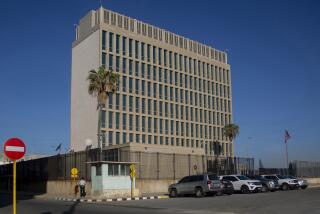Radiation from long Mars journey could damage astronauts’ brains

<p>When UC Irvine researchers exposed mice to radiation much like what exists in outer space, the animals suffered brain impairment.</p>
Many things would be difficult about conducting a manned mission to Mars, from designing a spacecraft that could make the 34-million-mile journey, to stocking and fueling it, to keeping its astronauts from getting flabby and bored.
On Friday, researchers shed light on another potential hurdle: figuring out a way to protect travelers’ brains from the damaging effects of cosmic rays in outer space.
When UC Irvine neuroscientist Charles Limoli and colleagues exposed mice to radiation similar to that astronauts would encounter far beyond Earth, the animals experienced changes in their brains that impaired their performance on tests of learning and memory, the team reported in an article -- “What happens to your brain on the way to Mars” -- in the journal Science Advances.
The researchers’ results suggested that astronauts could suffer cognitive impairment during an extended journey through space.
“Over the course of a two- to three-year mission, the damage would accumulate,” Limoli said. “To mitigate it, we need to understand it.”
To test the effects of space radiation on the brain, the researchers took mice to the NASA Space Radiation Laboratory at the Brookhaven National Laboratory in New York, which attempts to simulate radiation conditions in space. They exposed the animals to oxygen and titanium ions, atoms with their electrons stripped away that are similar to the charged particles in cosmic rays.
Six weeks later, back in California, they tested the mice’s learning and memory by placing them in pens with toys, letting them get used to their surroundings, and then making changes such as introducing a new toy. Mice that had been exposed to the radiation were less aware of or curious about the changes in their environment than controls that had not been irradiated -- a sign that they had cognitive deficits.
“A smart animal will recognize the change,” Limoli said.
When the researchers later studied the animals’ brain tissue, they found that mice that performed poorly on the tests also had less dense branching in their brain cells, due to damage from the radiation. The structural changes would impede the brain’s ability to transmit signals and process information.
Limoli got involved in the NASA-backed research as an outgrowth of his work on the effects of radiation on brain cancer patients. Radiation therapy forestalls brain cancer progression, he said -- but it can take a tremendous toll on the central nervous system, causing depression, anxiety and mood disorders, and deficits in learning and executive function. Pediatric patients can lose 20 to 30 I.Q. points after receiving radiation treatments to the brain.
“Doctors have gotten really good at curing cancer, but maintaining a good quality of life has been a problem,” Limoli said. “This is an unmet medical need.”
Astronauts flying to Mars and getting hit by cosmic rays, which are the remnants of supernova explosions, wouldn’t get anything close to the high doses of radiation that cancer patients receive, but they “might be prone to mistakes,” Limoli thought.
To counteract that threat during planning for a possible mission, scientists might come up with more advanced shielding options -- perhaps embedded in helmets -- or drug treatments that might ameliorate radiation’s impacts on the brain, similar to the ones Limoli is exploring for cancer patients.
For more on science and health, follow me on Twitter: @LATerynbrown







